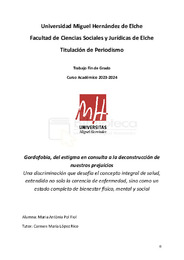Por favor, use este identificador para citar o enlazar este ítem:
https://hdl.handle.net/11000/32713Registro completo de metadatos
| Campo DC | Valor | Lengua/Idioma |
|---|---|---|
| dc.contributor.advisor | López-Rico, Carmen María | - |
| dc.contributor.author | Pol Fiol, Maria Antònia | - |
| dc.contributor.other | Departamentos de la UMH::Ciencias Sociales y Humanas | es_ES |
| dc.date.accessioned | 2024-07-26T08:36:04Z | - |
| dc.date.available | 2024-07-26T08:36:04Z | - |
| dc.date.created | 2024-06 | - |
| dc.identifier.uri | https://hdl.handle.net/11000/32713 | - |
| dc.description.abstract | La gordofobia es una discriminación sistemática que afecta a las personas que la padecen en todos los ámbitos de su vida. Una de las manifestaciones más evidentes es en la salud, tanto en la salud mental como la física. Un ejemplo de ello, es la patologización del cuerpo, es decir, la idea preconcebida de que los cuerpos gordos están enfermos. Este paradigma supone unas consecuencias morales, sociales y científicas diversas, como por ejemplo, intervenciones quirúrgicas y tratamientos muy agresivos, la falta de infraestructuras en el ámbito sanitario y la denuncia a los diagnósticos centrados únicamente en el peso. Una de las consecuencias de esta violencia estética que derivan de la gordofobia son los trastornos alimentarios. Uno de ellos, es la anorexia nerviosa atípica, que pasa desapercibida porque las personas, que tienen este trastorno, está por encima del normopeso, siguiendo los términos regulados por el IMC. En España alrededor del 400.000 mil personas padecen algún tipo de trastorno. Según los resultados de un estudio realizado por Observatorio de la Diversidad en los Medios Audiovisuales de España, concluyó que solo un 3% de los personajes que aparecían en televisión eran considerados gordos. Por otra parte, las redes sociales también tienen un papel relevante, ya que a raíz de ello, nacen los movimientos antigordofóbicos conocidos como el body-positive y el body-neutrally, que ayudan a las personas a cuidarse y aceptarse. Este reportaje pretende dar voz a la discriminación y mostrar los prejuicios que sufren estas personas a través de diferentes testimonios. A la vez que se utilizan fuentes expertas en salud mental, nutrición y sanidad con el objetivo de ofrecer diferentes puntos de vista y mostrar una visión holística de esta discriminación. Además, se complementa con una investigación a través de reportajes publicados en los medios de comunicación y estudios que abordan esta problemática. | es_ES |
| dc.description.abstract | Fatphobia is a systematic discrimination that affects people who suffer from it in all areas of their lives. One of the most obvious manifestations is in health, both mental and physical health. An example of this is the pathologization of the body, i.e., the preconceived idea that fat bodies are sick. This paradigm entails various moral, social and scientific consequences, such as, for example, very aggressive surgical interventions and treatments, the lack of infrastructures in the health field and the denunciation of diagnoses centered solely on weight. One of the consequences of this aesthetic violence resulting from fatphobia are eating disorders. One of them is atypical anorexia nervosa, which goes unnoticed because the people who suffer from it have a weight above normal weight, according to the terms regulated by the BMI. In Spain around 400,000 thousand people suffer from some type of disorder. According to the results of a study conducted by Observatorio de la Diversidad en los Medios Audiovisuales de España, it concluded that only 3% of the characters appearing on television were considered fat. Moreover, social networks also play a relevant role. On the one hand, the anti-fat-phobic movements create two social movements, body-positive and body-neutrally that help people to take care of themselves and accept themselves. This report pretends to give voice to discrimination and show the prejudices of this group with different stories and testimonies. At the same time, expert sources in mental health, nutrition and health are used in order to offer different points of view and show a holistic view of this discrimination. In addition, it is complemented by an investigation using reports published in the media and studies that cover this problem. | es_ES |
| dc.format | application/pdf | es_ES |
| dc.format.extent | 31 | es_ES |
| dc.language.iso | spa | es_ES |
| dc.publisher | Universidad Miguel Hernández de Elche | es_ES |
| dc.rights | info:eu-repo/semantics/openAccess | es_ES |
| dc.rights.uri | http://creativecommons.org/licenses/by-nc-nd/4.0/ | * |
| dc.subject | gordofobia | es_ES |
| dc.subject | discriminación | es_ES |
| dc.subject | salud | es_ES |
| dc.subject | patologización | es_ES |
| dc.subject | peso | es_ES |
| dc.subject | fatphobia | es_ES |
| dc.subject | discrimination | es_ES |
| dc.subject | health | es_ES |
| dc.subject | patologizathion | es_ES |
| dc.subject | weight | es_ES |
| dc.subject.other | CDU::0 - Generalidades.::070 - Periódicos. Prensa. Periodismo. Ciencias de la información | es_ES |
| dc.title | Gordofobia, del estigma en consulta a la deconstrucción de nuestros prejuicios | es_ES |
| dc.type | info:eu-repo/semantics/bachelorThesis | es_ES |

Ver/Abrir:
MEMORIA TFG.pdf
3,3 MB
Adobe PDF
Compartir:
 La licencia se describe como: Atribución-NonComercial-NoDerivada 4.0 Internacional.
La licencia se describe como: Atribución-NonComercial-NoDerivada 4.0 Internacional.
.png)